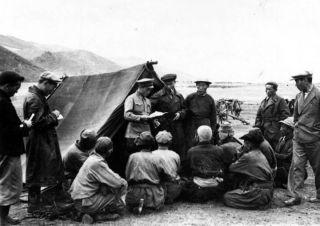ID :
366271
Wed, 05/06/2015 - 13:19
Auther :
Shortlink :
https://oananews.org//node/366271
The shortlink copeid
Across the Gobi and Khyangan for the common cause of victory

(Continuation of Colonel S.Ganbold’s interview “The contribution our Mongolia made to the Victory in the Great Patriotic War”)
Ulaanbaatar /MONTSAME/ As Mongolians called “1945 liberation war” is not only took a considerable place in Mongolia, but also in World history. Although the end of the WWII was the continuation of political policy of great powers in the World, Mongolia has historical and political reasons to solemnly mark victory in this war, underlined colonel S.Ganbold.
Mongolia has played a definitive role in the deterring the aggressive schemes of the Japanese army in the Far East. During World War II, the Mongolian army, together with Soviet army groups, fulfilled their role of being a force in the East.
In August 1945, in the concluding stages of World War II, the government of the MPR declared war on Japan. Four divisions and other formations of the Mongolian army took part in liberating north-east China and a number of regions of Inner Mongolia from Japanese invaders.
On February 4-11, 1945, the Yalta Conference took place in a Russian resort town in Crimea during World War II. At Yalta, U.S President Franklin D. Roosevelt; British Prime Minister Winston Churchill; and the Soviet Premier Joseph Stalin made important decisions regarding the end of the war and the post war world. At Yalta, Roosevelt, Churchill and Stalin discussed the conditions under which the Soviet Union would enter the war against Japan. One Soviet precondition for the declaration of war against Japan was the American official recognition of the status-quo of MPR.
Thus, the high command of the Soviet army planned to carry out a strong offensive in three directions to destroy the Japanese Kwantung Army in the Far East. One of these directions was at the eastern part of territory of Mongolia (Tamsagbulak region). Thus, the useful location of Mongolian territory and strick to be carried out from this part became one condition to involve Mongolia in war against Japan. From 1941 to 1945, the Japanese made hundreds of provocative attacks on the Mongolian border and the Kwantung Army set up special groups to employ bacteriological weapons in the attacks they were preparing to launch against other nations. Another reason for involving Mongolia in this battle was the issue on independence of the country. When Soviet Union was preparing for war against Japan, the delegation of Chinese People’s Republic visited the Soviet Union at the end of June of 1945, and discussed the issue concluding a friendship relations agreement between them. But, the sides were in disagreement regarding independence of the MPR. Finally, the Chinese delegation recognized Mongolia’s independence under a few of conditions. At the same time, Soviet leader Stalin received Mongolian Premier Kh.Choibalsan in Moscow on June 4, 1945 at a higher level and they agreed to involve the MPR in war against Japan. But, before meeting between Choibalsan and Stalin, military units of the Mongolian Revolutionary Army were ordered to move from the position where they located and accumulate their forces near the border region.
(to be continued)





